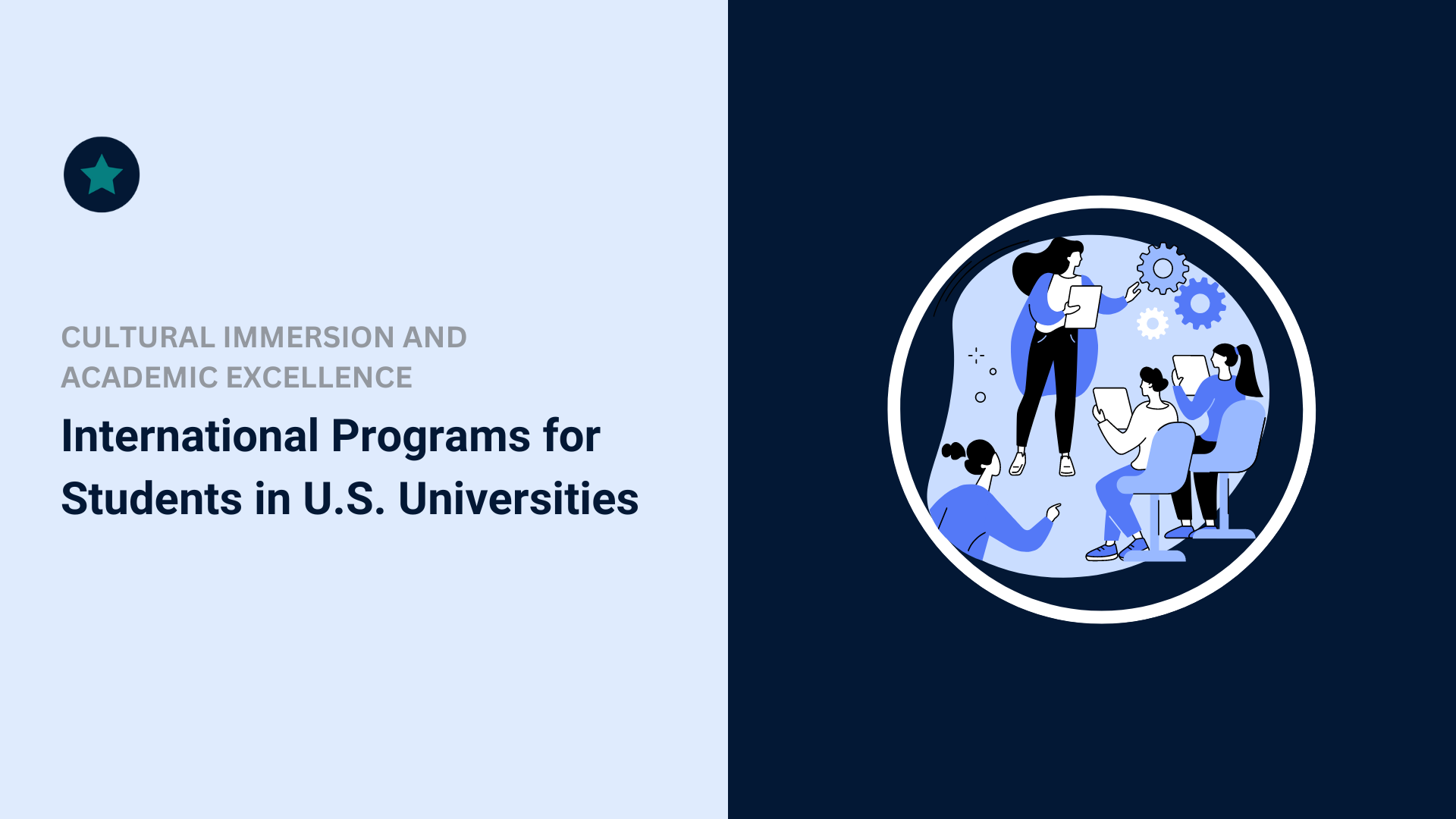International programs have become increasingly popular among students in the United States. These programs offer international students the opportunity to study, work, and immerse themselves in a new culture while receiving a world-class education.
For many international students, these programs can be life-changing experiences that open doors to new opportunities, personal growth, and a greater understanding of the world.
When studying abroad, international students have to cope with things like culture shock, language barriers, and homesickness. To get through these problems, it’s important to have a support system and look for resources and chances to connect with other students and the local community.
In this blog post, we’ll talk about the benefits of international programs for students at U.S. universities, the different kinds of programs that are available, and how to choose the right program for your needs and goals. In addition, we will discuss the challenges and opportunities of international programs and offer tips on how to get the most out of your time there.
Whether you are an international student interested in studying in the United States or a U.S. student interested in learning more about international programs, this post will help you make the most of this exciting and life-altering opportunity.
Benefits of International Programs
International programs offer a wide range of benefits for students at U.S. universities, including:
Cultural Immersion
One of the best aspects of international programs is the opportunity to immerse oneself in a different culture.
Living and studying in a foreign country allows students to experience a new way of life, try new foods, learn new customs, and develop a deeper understanding of diverse cultures.
Students can become more receptive, empathetic, and culturally aware by learning to appreciate cultural differences. This will benefit them on a personal and professional level.
Networking Opportunities
Additionally, international programs offer students invaluable networking opportunities. Students can expand their professional and social networks and develop long-lasting relationships by interacting with people from various countries and cultures.
These connections can be useful for discovering employment opportunities, gaining knowledge about various industries, and gaining new perspectives.
Academic Growth
International programs can also be instrumental in fostering academic growth. Students can gain exposure to different academic systems, learn from renowned professors, and take courses that may not be available at their home university.
This can expand their academic horizons, challenge their critical thinking, and enrich their overall academic experience.
Personal Growth
International programs can also have a profound impact on personal growth. Students are required to adjust to a new environment, overcome language barriers, and negotiate cultural differences. This can be a difficult but rewarding experience that helps students develop independence, resiliency, and confidence.
Overall, international programs provide students at U.S. universities with the opportunity to obtain a world-class education, broaden their cultural horizons, and acquire skills that can be personally and professionally beneficial.
Need to speak to a former U.S. consular officer?
Types of International Programs for Students in U.S. Universities
Study Abroad Programs
Study abroad programs are the most common type of international program. These programs allow students to spend a semester or a year studying at a university in another country while earning academic credit that can be transferred back to their home university. There are two main types of study abroad programs:
- Faculty-Led Programs: These programs are led by faculty members from the student’s home university and are typically shorter in duration. They often involve a group of students traveling together to a foreign country and taking courses that are taught by a faculty member or local professors.
- Exchange Programs: Exchange programs enable students to study at a partner university abroad while hosting a student from the same institution at their home institution. Typically, these programs are longer and require students to apply for admission to the partner institution.
Internship Programs
Internship programs provide students with the opportunity to gain international work experience while earning academic credit.
Students interested in pursuing a career in an international field, such as international business, diplomacy, or non-profit work, can greatly benefit from these programs. Some internships may require prior work experience or language proficiency.
Language Programs
Language programs are designed for students who want to improve their language skills while also immersing themselves in a new culture.
These programs may be short- or long-term and are typically offered in countries where the target language is spoken. Classes in the target language, cultural immersion activities, and homestays with local families may be included in language programs.
Service-Learning Programs
Service-learning programs combine academic coursework with community service in a foreign country. These programs can be particularly rewarding for students interested in social justice, community development, or public service.
Service-learning programs may include volunteer work, internships with non-profit organizations, and academic coursework focused on social issues.
Research Programs
Research programs offer students the opportunity to conduct research in a foreign country under the guidance of a faculty mentor.
These programs can be a great way for students to gain hands-on research experience while also immersing themselves in a new culture. Research programs may be focused on a variety of fields, including science, social sciences, and the humanities.
All in all, there are many different types of international programs available for students at U.S. universities, each with its own unique benefits and opportunities.
Students should carefully consider their academic and personal goals when choosing a program to ensure it aligns with their interests and needs. They should also research the program thoroughly to ensure it meets their academic requirements and budget.
Renowned Universities for International Programs
Some U.S. universities stand out for their exceptional international program offerings and dedication to global education. Here are some of the most prestigious institutions for international programs:
New York University (NYU)
With over 21,000 international students and scholars from more than 120 countries, New York University has the highest number of international students in the United States.
The University has degree-granting campuses in New York, Abu Dhabi, and Shanghai, as well as 11 global academic centers and research programs in over 25 countries. Throughout the year, NYU hosts programs and events designed to facilitate the transition into student life and community building.
From orientation programs to International Education Week activities, international students have numerous opportunities to connect with the NYU community and build their own networks.
A number of international institutes and centers, such as the Center for European and Mediterranean Studies and the Center for Global Affairs, are also located at NYU.
University of California (UC)
The University of California is a popular choice for international students seeking academic excellence and a diverse community. With nine campuses and over 150 academic disciplines, UC offers students an unparalleled range of educational opportunities.
In fact, UC boasts more top-10 departments than any other university in the United States, whether public or private. It’s no wonder that international students from more than 100 countries choose UC as their academic home.
The Education Abroad Program (EAP) of the University of California allows you to explore the international side of your field of study by attending a top-tier university or participating in an internship or special-focus program in one of 40 countries.
Georgetown University
Georgetown University is a private institution in Washington, D.C. The university has a strong commitment to global education and provides a vast selection of international programs for students seeking a unique and immersive global experience.
Georgetown offers a variety of opportunities through its Office of Global Education, including study abroad, international internships, and cultural immersion programs. Georgetown has over 120 partner universities in over 40 countries, providing students with a diverse selection of courses and experiences.
In addition, Georgetown offers a number of grants and scholarships to students interested in international experiences. In addition to its international academic offerings, Georgetown has a number of initiatives and clubs that focus on international issues, including the Global Business Initiative, the International Relations Club, and the Global Humanitarian Action Program.
Through these initiatives and clubs, students can gain a deeper understanding of global affairs, engage in meaningful dialogue and debate, and develop meaningful relationships with peers from around the globe.
Harvard University
Harvard University is one of the most prestigious and well-known private universities in the world, located in the city of Cambridge, Massachusetts. Harvard’s commitment to global engagement is reflected in the numerous international centers and institutes on campus, including the David Rockefeller Center for Latin American Studies and the Harvard Asia Center.
If you’re an international student looking to expand your horizons, Harvard offers a wide range of international programs to choose from. These programs include study abroad opportunities, international internships, and cultural immersion programs.
With over 200 partner universities in more than 60 countries, Harvard students have an abundance of opportunities to gain a unique, global experience. Harvard also offers several grants and scholarships for those wishing to pursue an international experience, making it more accessible to students from diverse backgrounds.
Additionally, Harvard has a variety of initiatives and clubs that focus on global issues, providing students with a platform to engage with global challenges and make a positive impact in the world. These include the International Relations Club, Harvard Model United Nations, and the Harvard Global Health and AIDS Coalition.
University of Michigan, Ann Arbor
The University of Michigan, located in Ann Arbor, Michigan, is a popular public research university strongly committed to global engagement. The university offers a diverse array of international programs, including study abroad, internships, language programs, and research opportunities, which provide students with a unique and immersive global experience.
With over 300 partner universities in more than 75 countries, the University of Michigan provides students with an abundance of international experiences to choose from.
The University of Michigan is also home to a number of international centers and institutes, such as the Center for Middle Eastern and North African Studies and the Center for South Asian Studies, which offer opportunities for students to deepen their understanding of different cultures and global issues.
In addition to its international academic programs, the University of Michigan also has a number of initiatives and clubs that focus on global issues. The International Policy Council, Global Health Initiative, and Global Business Club are just a few examples of the many initiatives and clubs available to students.
Northeastern University
Northeastern University in Boston, Massachusetts, is a renowned private research institution that provides a wide range of opportunities for international students looking to gain a unique global perspective. Northeastern has established more than 3,000 partnerships with universities and employers across the world, which enables students to gain an immersive learning experience in various fields.
Northeastern University offers a variety of international programs to help students further their education and achieve their career goals. One of the popular programs at Northeastern is the MS in Global Studies and International Relations, which provides students with a deeper understanding of global issues and prepares them for careers in the international arena.
In addition to these programs, international students at Northeastern University have access to a wide range of elective courses that they can customize to create a personalized degree. With its strong emphasis on online learning and flexible course offerings, Northeastern University is a great choice for students seeking a comprehensive and customizable educational experience.
To sum it up, these universities stand out for their commitment to global education and their wide range of international programs. Students who are interested in studying abroad or pursuing other international programs should consider these universities as they begin their search for the perfect program.
However, it’s important to note that there are many other universities with exceptional international programs. Students should research various options to find the best fit for their needs and interests.
How to Choose the Right International Program
Choosing the right international program can be a daunting task, but with some careful consideration and research, students can find a program that is a perfect fit for their needs and interests. Here are some factors to consider when choosing an international program:
Academic fit
Students should look for programs that offer courses that align with their academic interests and goals. It’s important to ensure that the program will provide them with the academic credit they need to stay on track for graduation. Additionally, students should consider whether the program’s curriculum will challenge them academically and provide opportunities for intellectual growth.
Location
Location is an essential consideration when selecting an international program. When choosing a location, students should take climate, culture, language, and safety into account. They should also consider whether they want to live in a metropolitan or rural area, as well as whether they want to be near cultural or historical sites.
Cost
International programs can be expensive, so it’s important to consider the cost of the program and any additional expenses such as travel, housing, and food. Students should research scholarships, grants, and other financial aid options that may be available to help offset the cost.
Duration
Students should consider how long they want to be abroad—whether they want to participate in a short-term program or a full semester or year. It’s also important to think about whether they want to participate in multiple international programs during their time in university.
Support
Students should look for programs that offer strong support systems, such as on-site advisors, language tutors, or cultural orientation programs. It’s also important to consider whether the program has a good track record of supporting the needs of international students.
Personal goals
Finally, students should think about their personal goals for participating in an international program. Do they want to improve their language skills, gain work experience, or explore a new culture? By identifying their goals, students can choose a program that aligns with their interests and aspirations.
Choosing the appropriate international program necessitates careful consideration of a variety of factors. Students can find a program that is a perfect fit for their academic, personal, and professional goals by researching and evaluating their options.
Challenges and Opportunities of International Programs
While participating in international programs can offer numerous benefits, it’s important to be aware of the challenges that students may face when studying abroad. Here are some of the most common challenges and opportunities of international programs:
Culture shock
Culture shock is a common challenge for students participating in international programs. Adapting to a new culture, language, and environment can be overwhelming and stressful, but it can also be an opportunity for personal growth and development.
Homesickness
Being away from home and loved ones can be difficult, and students may experience homesickness or feelings of loneliness. However, students can overcome these challenges by making new friends, staying in touch with loved ones, and participating in cultural activities and events.
Academic rigor
International programs can be academically challenging, and students may need to adjust to new teaching styles, academic expectations, and cultural norms. But these challenges can also provide opportunities for intellectual growth and development.
Language barriers
Language barriers can be a significant challenge for students participating in international programs. Though, by immersing themselves in the language and culture, students can develop their language skills and gain confidence in their ability to communicate in a new language.
Personal safety
Personal safety is a concern for students participating in international programs, and it’s important for students to be aware of potential risks and take steps to stay safe. Students should research the safety of the location, follow local customs and laws, and take precautions to avoid risky situations.
Career opportunities
Participating in international programs can provide students with valuable skills and experiences that can be advantageous in their future careers. Students who participate in international programs often develop cross-cultural communication skills, gain exposure to diverse perspectives, and build networks that can be valuable in their future careers.
Personal growth
Participating in international programs can be a transformative experience that provides students with opportunities for personal growth and development. By stepping outside of their comfort zone and immersing themselves in a new culture, students can gain a sense of independence, self-awareness, and confidence that can benefit them throughout their lives.
Participating in international programs can be complicated, but it can also be a tremendously rewarding experience that provides numerous opportunities for personal and professional development. By fully grasping the difficulties and advantages of international programs, students can be better prepared to make the most of their time abroad.
Conclusion
In conclusion, international programs at U.S. universities can provide students with opportunities for personal and professional development. By participating in international programs, students can gain exposure to new cultures, perspectives, and ways of thinking, thereby expanding their horizons and preparing them for success in a world that is becoming increasingly globalized.
While there are numerous types of international programs available, it’s important for students to choose the one that best fits their academic and personal goals. Students should research different programs, consider their academic and language abilities, and evaluate the cultural and social environment of the program before making a decision.
It’s also important for students to be aware of the challenges that come with participating in international programs, including culture shock, academic rigor, language barriers, and personal safety. By understanding these challenges, students can be better prepared to navigate them and make the most of their experience abroad.
In general, international programs can be a transformative experience that provides students with opportunities for personal and professional growth. By choosing the right program, preparing for the challenges ahead, and embracing the opportunities that come with studying abroad, students can maximize their international experience and gain lifelong skills and experiences.
(This blog post was written by our Content Strategist, Kausar Shaikh)
DISCLAIMER:
This blog does not endorse or advocate for any illegal activities. All content presented here is intended for educational purposes only. The viewpoints expressed do not constitute legal advice and are solely based on the writer’s opinions and experiences. Please use the information provided responsibly. Any advice given is of a general nature and should be applied to your specific circumstances with caution and consideration.
Copyright © 2024 UDETI LLC. All rights reserved.





